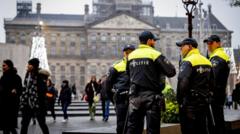The aftermath of the violence has seen disturbing patterns emerge as activists and community leaders urge for mutual understanding. Local Rabbi Lody van de Kamp likened the situation to a tinderbox, having predicted an inevitable clash after the increased tensions due to the ongoing Israeli-Palestinian conflict. Emine Uğur, a columnist, emphasized that the unrest was a long time in coming, attributing it to unaddressed grievances within the communities. Footage of provocations, including the burning of a Palestinian flag by Maccabi supporters, stoked anger and led to subsequent retaliatory rhetoric on social media.
The political ramifications are equally alarming, with the ruling coalition facing strains, notably the resignation of Moroccan-born junior minister Nora Achahbar amidst concerns over racist language among colleagues. This moment has sparked a fierce debate on the responsibilities of integration and the appropriate framing of discussions around antisemitism and Islamophobia, with voices from both communities warning against dangerous narratives that could exacerbate divisions.
Governmental responses have included a financial commitment of €4.5 million to combat antisemitism and aid victims, but concerns linger that these measures could fall short in addressing the underlying issues. Leaders from the Jewish community, including Esther Voet, are coordinating emergency responses to maintain community safety while grappling with fears reminiscent of historical violence against Jews. Conversely, the Muslim community feels unjustly blamed for the actions of a few, with some like historian Nadia Bouras highlighting the implications of labeling a long-standing community as unintegrated.
As the city seeks to rebuild trust post-violence, academics and leaders across the spectrum advocate for careful dialogue and a focus on shared humanity. There is a collective recognition from both Jewish and Muslim voices that navigating through this crisis will require acknowledging each other's pain and building bridges to prevent further escalation. The events in Amsterdam have uncovered not just a fragmented community but a stark reminder of the need for reconciliation in the face of discord in contemporary European society.
The political ramifications are equally alarming, with the ruling coalition facing strains, notably the resignation of Moroccan-born junior minister Nora Achahbar amidst concerns over racist language among colleagues. This moment has sparked a fierce debate on the responsibilities of integration and the appropriate framing of discussions around antisemitism and Islamophobia, with voices from both communities warning against dangerous narratives that could exacerbate divisions.
Governmental responses have included a financial commitment of €4.5 million to combat antisemitism and aid victims, but concerns linger that these measures could fall short in addressing the underlying issues. Leaders from the Jewish community, including Esther Voet, are coordinating emergency responses to maintain community safety while grappling with fears reminiscent of historical violence against Jews. Conversely, the Muslim community feels unjustly blamed for the actions of a few, with some like historian Nadia Bouras highlighting the implications of labeling a long-standing community as unintegrated.
As the city seeks to rebuild trust post-violence, academics and leaders across the spectrum advocate for careful dialogue and a focus on shared humanity. There is a collective recognition from both Jewish and Muslim voices that navigating through this crisis will require acknowledging each other's pain and building bridges to prevent further escalation. The events in Amsterdam have uncovered not just a fragmented community but a stark reminder of the need for reconciliation in the face of discord in contemporary European society.


















